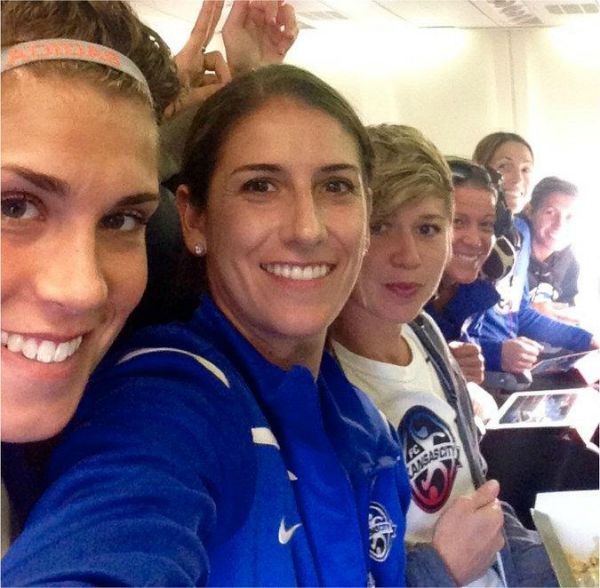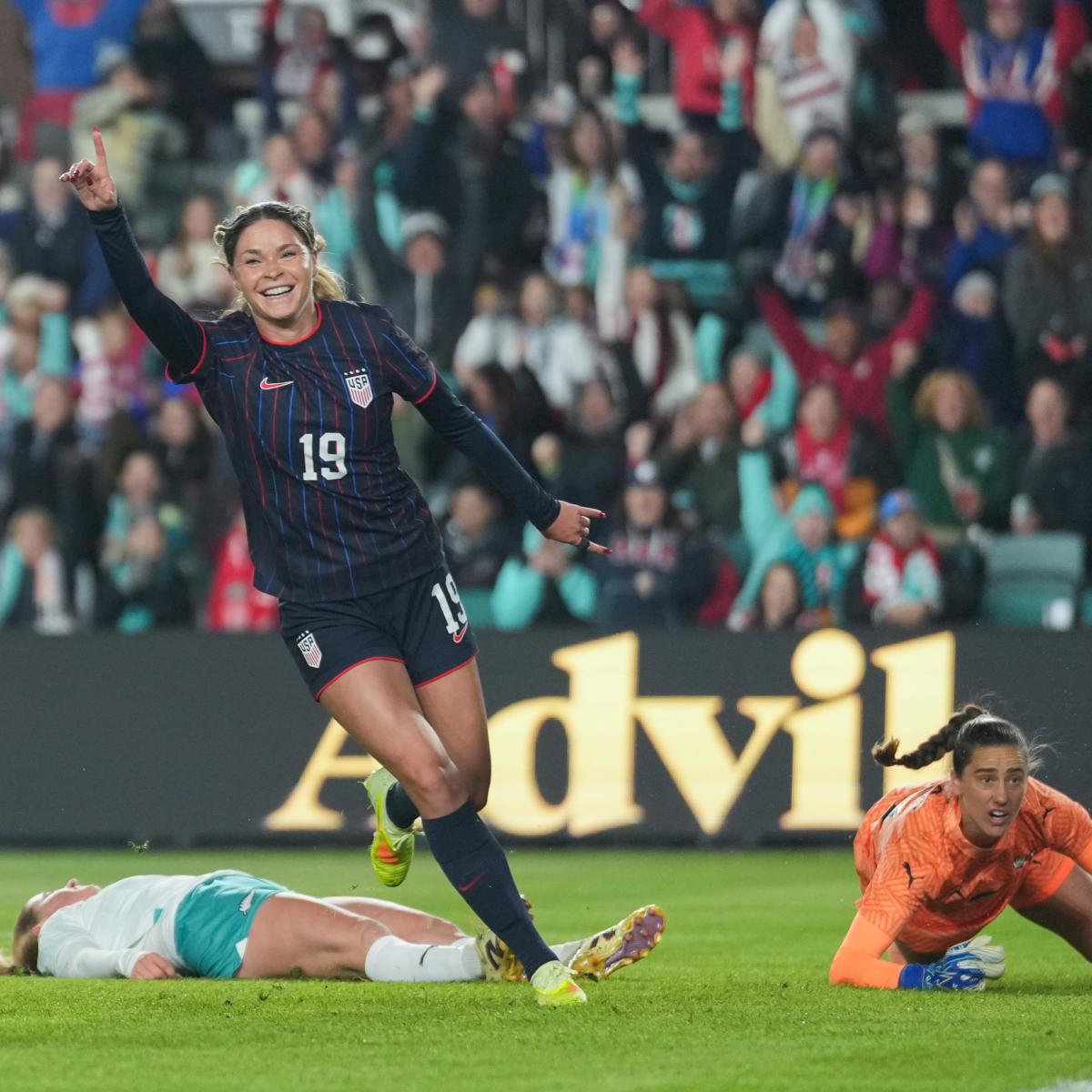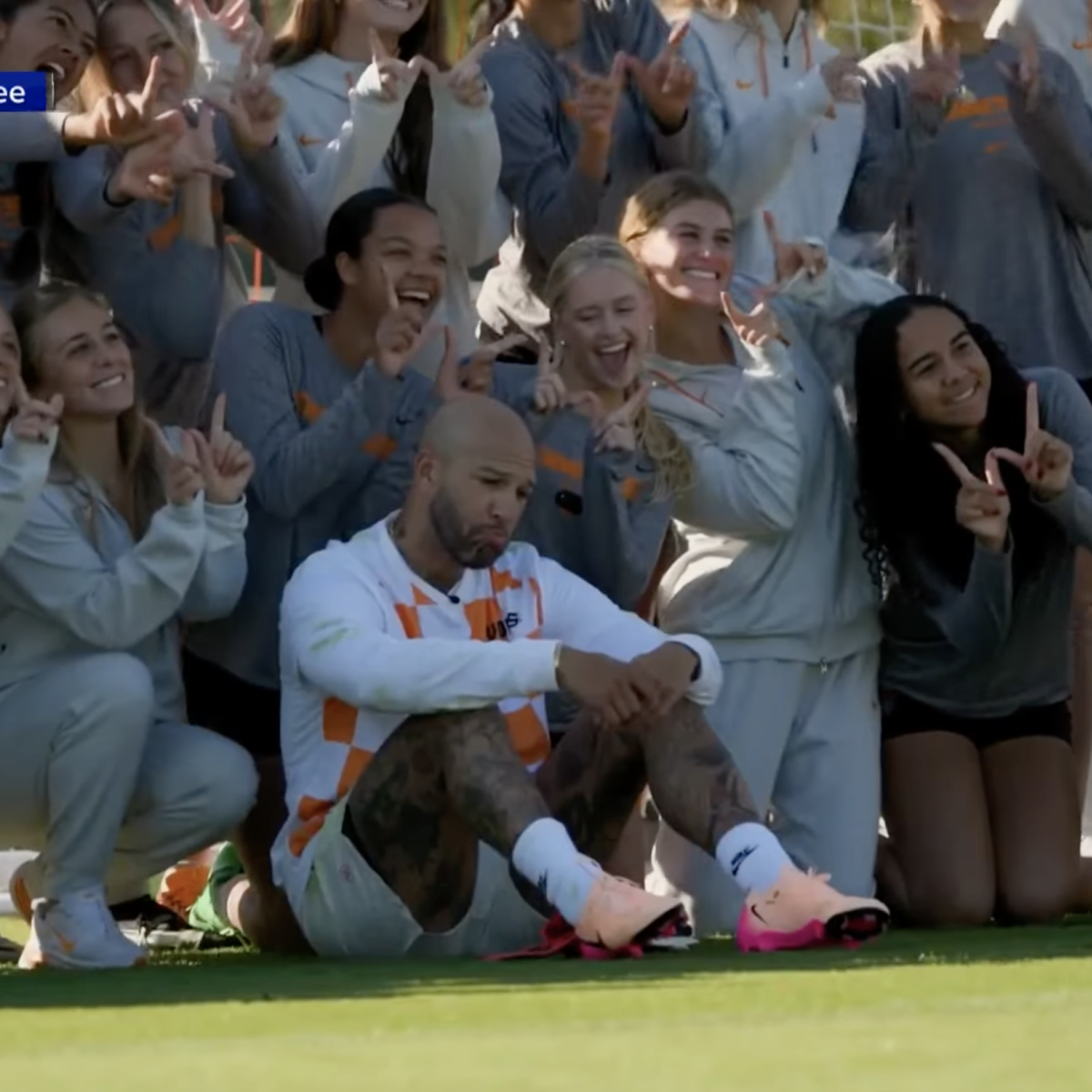Screaming fans, a sold-out stadium, waving banners and chants from the crowd that reach the players in the locker room before they take the field. This will be the spectacle awaiting Kansas City FC and Seattle Reign FC when they arrive in Portland for this week's 2015 NWSL Final. It will be played in front of a crowd at Providence Park, home of both the Portland Timbers and Portland Thorns FC and, coincidentally, one of the most rabid fan bases in all of soccer.
It will also be a rematch of last year's final, in which Kansas City edged out Seattle 2-1 on Seattle's home turf at Starfire Stadium.
This year's NWSL final will be a much bigger production, with capacity for 22,000 screaming fans at Providence Park – and a national audience on Fox Sports 1 – instead of the modest 4,000 fans that last year's Starfire Stadium could hold.

What will the extra 18,000 fans mean for the NWSL final? Kansas City FC midfielder Yael Averbuch thinks a lot.
"It's going to be a really great sporting event for women's soccer," she says. It is a week before Kansas City take on Seattle, which during the playoffs is an eternity. This year's NWSL final falls unusually late in the season, as October 1st is the only TV time the NWSL could secure. Despite the delay, it's clear there will be great energy headed into the final.
"It's going to look really great and feel really great," she says. "People who maybe don't watch any other women's soccer games all year, or maybe if they've just watched the World Cup and they've never seen an NWSL game, to see a full crowd and people cheering is very important.
Fans can, and should, look at this progress as a sign that women's soccer in the United States is headed in the right direction – that, just maybe, a women's match is getting the same attention that matches on the men's side of the game regularly receive.
Examining the facts – a 5x leap in attendance for the NWSL final, a World Cup win for the United States with record ratings, a sold-out USWNT victory tour with 30,000+ tickets sold for each and every match – one could conclude that women's soccer has truly arrived.
On the other hand, maybe that's just the easy takeaway.
Perhaps the more interesting story about the 2015 NWSL Final, the 2014-2015 NWSL season and even women's soccer as a whole lies beneath the surface of these high profile victories. Perhaps, the story is better understood by looking deeper, examining things that most casual soccer fans don't see.
This is a story about players whose names aren't trending on Twitter, players who aren't getting calls from advertisers and media, but who nevertheless juggle families and second careers to play the game they love.
It's a story about players coming off the bench to fill a key spot on the roster, who play with a spirit and determination that proves a team is really defined by its uncelebrated contributors rather than its most recognizable stars.
It's most likely the story that will define the outcome of Thursday's NWSL final and the future of the league as a whole.
The 2015 NWSL Final And A Season Defined By Depth
A common theme arises when talking to players in both Kansas City and the Seattle.
Case in point, something that Seattle Reign midfielder Keelin Winters says during our conversation about the upcoming NWSL final.
"Whenever there's a World Cup or international friendly…periods of time when you're going to be missing some of your key players, it's an opportunity for the players who don't get to play as much to step up and show why they're on the team."
"Mariah [Bullock] is a really good example," Winters continues. "She got subbed into the game [against Washington in the semi-finals] and scored that third goal. She's been that player for us all season. We've had players able to step up and show what they're made of."
This idea, that depth off the bench has defined the NWSL season, is echoed in Kansas City by defender Becca Moros as she describes the contribution of national team veterans Amy Rodriguez, Becky Sauerbrunn, Heather O'Reilly and Lauren Holiday.
"They have increased our depth overall," she says. "Our four top starting players show up and all of a sudden we have an incredibly deep bench because those players on the bench were playing significant minutes all season. Which means players can come in and change the game late in the game. That's really helped us be strong for a full 90 minutes."
That's not to say the big names don't make a difference. Winters has this to say about Seattle teammate Megan Rapinoe, a star of the 2015 USWNT World Cup win.
"Whenever Pinoe is on the field, you can just feel the other team – it's hard to describe – but when she gets the ball, you can almost feel the other team being like, 'Oh shit.' She is so creative, you don't know what she is going to do with the ball. She's more often than not generating good opportunities for others."
It turns out, the real strength of USWNT players like Rapinoe is their ability to bring the best out of teammates. As Moros puts it, this is the "trickle down" effect that USWNT veterans have on the rest of the team.
It is a point widely recognized by players, but seldom talked about in the 140 character headlines that dominate the news cycle after big matches. After all, it's easier and catchier to declare Carli Lloyd the player of the year (guilty as charged) than it is to explain the nuance of how other, less recognizable names elevate their game to contribute in equal part.
But contribute in equal part they do. And during a season that saw national team players absent from NWSL clubs for a large chunk of the year, many games saw players off the bench creating all the opportunities.
"We have a very deep team," Averbuch says. "Not only do we have four wonderful national team players who can carry our team on and off the field, we have a lot of national-team-calibre players as well. For other players to be able to step up in times when national team players aren't here has been huge. As a team unit, it has left us with a good feeling that we all have contributed."
"The difficulty," Averbuch concedes, "has been finding our rhythm and getting comfortable playing together. We've had to consistently adjust to playing with and without them, and training with and without them."
Nikki Marshall, a former USWNT and Portland Thorns defender, points out that this can be a challenging situation for players and coaches alike. After all, what is a team except the sum of its parts and the sum of the chemistry that a group of players can muster on the pitch?
"You build a rhythm and a chemistry that's really important," Marshall says. "It doesn't matter how many great individuals you have, oftentimes it's a matter of how you perform as a team. Certainly not having [USWNT] players there and then having them back, when they expect to play and deserve to play, is hard for the rest of the team that's been there and working with the team the whole time."
Whatever challenges this may bring, Marshall says the benefits far outweigh them.
"The presence of these players is fundamental in what we're trying to do, in building the league, in getting people interested in the game. These women are on the World Cup stage and people see them. And so, if they're not there, I hate to say it, but people aren't really sure who everyone else is."
In The Trenches Of Professional Women's Soccer
It's a fact of life that any fresh face in professional women's soccer must confront. It's a story bubbling beneath the surface of the NWSL, and really any female sport: how challenging it can be to toil in anonymity outside the small spotlight the media designates for female players.
Less media coverage and fewer advertising dollars lead to smaller budgets and lower salaries for players. As of 2015, player salaries in the NWSL range from $6,000 to $30,000, which is hardly a living wage. (In fact, it's below the poverty line.) This compares to minimum annual salaries in U.S. professional men's sports ranging from $60,000 (Major League Soccer) to $550,000 (surprisingly, the NHL).
This is a reality that, while harsh, professional women's soccer players understand and deal with every day.
"The expectations for female athletes, especially soccer players, are certainly higher," Marshall says. "But, that being said, this is how we live."
When asked what she means, Marshall says, "These women aren't just pros on the field. They are pros at juggling 50 different things at once, whether it be two jobs, or family, or having to move all the time. It's part of the lifestyle. You accept it and you deal with it and you become good at not being stressed out by those situations. That's just how it is."
It turns out, not even USWNT players – with income from the National Team roster and larger opportunity for endorsement deals – are fully exempt.
"It's difficult for any player, anytime you're traveling that much," Moros says. "Generally Amy and all the national team players who have been in and out to see family, for the victory tour and for the World Cup tournament itself, they've had a lot of things to balance and manage. Fortunately, they do it quite gracefully."
As we speak, Moros herself is preparing for a cross-country move to her offseason home in Portland, Oregon. When I ask how she's dealing with the stress and distraction of the impending move in the face of the NWSL final, she's quick to point out that her situation isn't unique.
"All the players are dealing with their own version of balancing that. Figuring out how to move, what your resources are, do you store things, do you take everything with you? And, on top of that, every year there are contracts that get renegotiated. There's probably going to be an expansion draft if another team comes into the league. Things are constantly moving. There's just not a lot of security."
It's a burden female soccer players bear, but at the same time take in stride and even laugh about.
"We really enjoy what we do," Averbuch says. "We love attempting to improve every day and we really enjoy each other's company. Whatever struggles we go through in the process to make this work, it's because we really do love our jobs. And I think the ability to have a sense of humor about things helps."

Asked if it bothers her that the casual fans – the 43.2 million Americans who watched the 2015 Women's World Cup final – likely have no idea about the behind-the-scenes struggles for most NWSL athletes, Averbuch says, "I don't think people even realize how much we all do and how deeply we care about soccer."
"If we really delve into the stories of what all these women are doing, have done and will do to continue to play at the highest level and make this career work, it's really phenomenal: raising families, being in long distance relationships, holding second jobs, training for months during the off-season with no team environment. These are the stories you don't hear, but you see the final product."
The Road Ahead: From An Event To A Household Sport
This brings us back to Portland, the 2015 NWSL final, the 22,000 screaming fans, the big names fresh off the USWNT victory tour – a.k.a. the "final product," packaged for the viewing public and made to appear like the norm when it is anything but.
Which begs the question: How can the NWSL and women's soccer go from a huge event sport, garnering headlines and public attention for only the biggest matches, to a household sport that attracts a regular season following and, with it, media coverage and advertising.
No longer an active professional herself (she retired this year), Marshall has some distance from which to reflect upon the significance of the impending match between Kansas City and Seattle.
"Especially in the women's game, these games are huge because these players have a platform," she says. "These are the games that are televised. We have this hidden league that no one knows about until the final. So, it's important."
In this context, it's a smart strategic move on the NWSL's part to move the 2015 NWSL Final to Portland, Oregon. Like Seattle, it is a hotbed for European-style soccer enthusiasm in the United States and the raucous vibe within the stadium will be likely to transmit through the television and to reach casual fans at home.
Portland also represents a model market where men's and women's soccer have managed to cross over, going from event sports to household sports with season ticket holders and a solid fan base for regular season matches. As one example, the Thorns set several records for attendance in 2015 with multiple crowds of 20,000+ and sold out season tickets.
One only has to watch an episode of Portlandia, though, to know that the odds of middle America becoming more like Portland quickly are slim (no matter how fast mustache trends may spread).
Averbuch and other NWSL players know it's going to be a slow process.
"It's going to take patience," she says. "It's not something that will happen in a year or two. We're talking about a long-term plan of five- to ten-plus years…Women's sports don't usually get as much support or viewership. But I definitely think we have the potential to make it work and to make people into supporters."
The NWSL will bank on this as it heads into the 2015 championship and the 2016 season to come, only its fourth in existence.
Meanwhile, players like Keelin Winters are focused on leaving it all on the field, giving the fans who tune in to the NWSL final a show to rival that of any major sport – men's or women's.
"Something that has always helped me get in the zone has been focusing on the physicality of the play. That's a big part of my game and something that a lot of people don't talk about. Soccer is a physical sport, and you would put your body on the line for your team and those three points."
In the same way, it's obvious that each player would gladly put her heart, body and soul on the line for the sport they love – and this, more than anything, will win an audience for the NWSL in the long run.
It should also make for highly entertaining showdown between Kansas City and Seattle come Oct. 1.
Watch the 2015 NWSL Final at Providence Park in Portland, OR on FOX Sports 1 at 9:30pm E.S.T. , October 1st.
To learn more about how you can support women's soccer in the United States, visit our "Beauty Is A Beast" home page. We've created a scholarship fund that will go towards sending female high school soccer players to college.
Correction: We previously stated that the NWSL final was sold-out. Currently, there are still tickets available, with 10,000+ tickets sold as of September 25th. Ticket information, from nwslsoccer.com, is as follows:
"Tickets go on sale to the public on Friday, Aug. 28, at 10 a.m. Fans will be able to purchase tickets by calling (888) 736-6849 or online at www.portlandthornsfc.com. In addition, fans are also able to purchase tickets at the Providence Park box office. The Providence Park box office is open Tuesday through Thursday, 10 a.m. to 2 p.m. PT and Friday and Saturday, 10 a.m. to 5 p.m. PT. Portland Thorns FC season ticket holders will have access to an exclusive presale beginning Wednesday, Aug. 26, with details to be emailed to ticket holders later this week. Tickets will be held for fans of both participating teams and will be made available in a special sales window once the teams are set."




